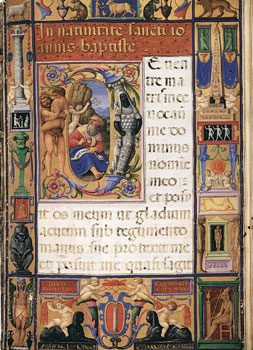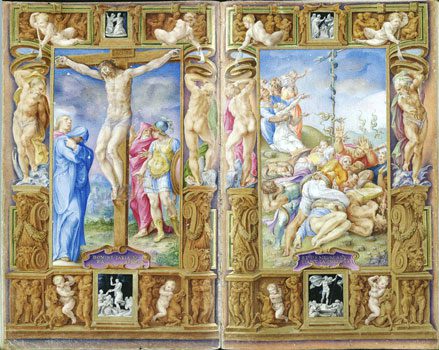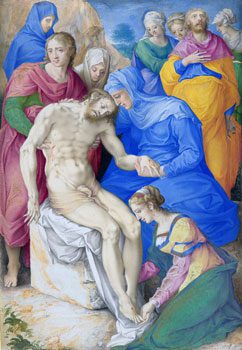

Moses and the Brazen Serpent

For much of his career, Giorgio Giulio Clovio, the greatest miniaturist and manuscript illuminator of his time, was pursued by ill luck. Born in Croatia in 1498 and first working in Venice, he went to seek his fortune in the service of the King of Hungary. But unfortunately the King was defeated and killed by the Turks in the battle of Mohacz (1526), the Turks overran Hungary, and Clovio had to escape to Rome. He barely arrived there to find the city taken and sacked by the desperate Imperial Spanish and German mercenaries of Charles V (1527):
[He] was taken whilst in the house of his employer, Cardinal Lorenzo Campeggio. One would have thought that a quiet and inoffensive young man of no particular distinction would have escaped unnoticed. But not so. He was beaten, starved almost to death, and rendered so completely miserable that he solemnly vowed, if he ever recovered his liberty, to devote himself to a religious life . . .
Not long afterwards it happened that Don Giulio, in transferring himself from one monastery to another, as monks or friars do, by misfortune broke a leg. Being therefore conveyed by those fathers to the monastery of Candiana, that he might be better attended, he lay there for some time without recovering, perhaps having been wrongly treated, as is common, no less by the fathers than by the physicians. Which hearing, Cardinal Grimani, who much loved him for his excellence, obtained from the Pope the power to keep him in his service and to have him cured. Whereupon Don Giulio, having thrown off the habit, and his leg being healed, went to Perugia . . .
Later on, in France, he developed a fever, but prayed and recovered. Then back in Italy, “there happened to him another unexpected and more than ordinarily severe misfortune. His health was probably permanently injured by his sufferings thirty years before in Rome. Now his left eye became so seriously diseased as to threaten loss of sight. In January, 1558, he was compelled to undergo an operation which fortunately proved successful. . . . In a letter still extant . . . he mentions this misfortune as to his sight,” saying that he knows of a certain “clever surgeon oculist” who has cured other prominent persons and that he wishes to try this, hoping that in a week he would be all right but that this “cannot be done without an operation, which somewhat frightens him . . . The next letter he tells us that this Maestro Battista, the Florentine oculist, had skillfully performed the operation which he minutely describes, and is thankful to say that his sight is quite restored.”
Despite his misfortunes, Clovio lived to a ripe old age: “although he is old and does not study or attend to anything save to seeking the salvation of his soul by good and holy works and . . . is in every way an old man, yet continues to work at something, there where he lives well attended and in perfect peace in the Palace of the Farnesi . . .” He died in 1578.
References
- Vasari, Giorgio. Lives of the Artists.
- Bradley, JW. The life and works of Giorgio Giulio Clovio, Miniaturist. London, 1891.

Leave a Reply